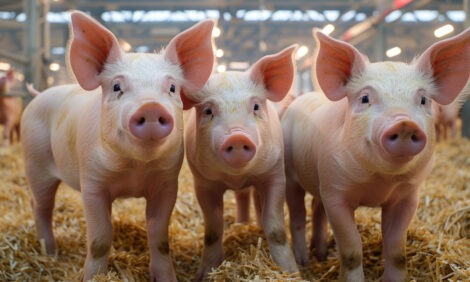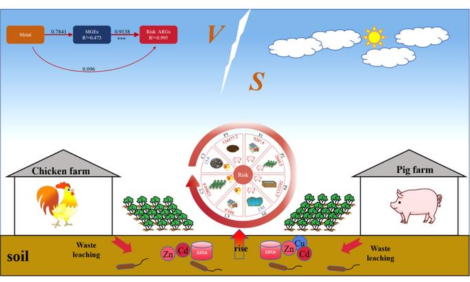



Newly identified key gene is critical for African swine fever infection
Study pinpoints immunity-linked gene in pigs required for replicationAfrican swine fever virus (ASFV) is a lethal animal pathogen that enters its host cells through endocytosis. So far, host factors specifically required for ASFV replication have been barely identified.
A team led by the Friedrich-Loeffler-Institut (FLI) and the Roslin Institute of the University of Edinburgh set out to find out which pig genes are needed for the African swine fever virus (ASFV) to replicate. In lab tests they examined a collection of pig cells, each one edited to lack a specific gene compared with the rest, to observe how they responded to ASFV.
Their study shows that a gene from the pig's immune system is crucial for ASFV to replicate and cause infection. This provides important new insights into the biology of the ASF virus, which can serve as a basis for future research approaches. In particular, the identified gene offers a suitable approach for the development of effective therapeutics against ASFV infections or ASFV-resistant pig breeds.
ASFV has a large DNA genome from which more than 160 viral proteins are produced in infected cells. Little is known about the functions of many of these viral proteins. It is also not clear which cellular proteins ASFV uses to enter the host cell.
To identify host proteins important for ASFV, scientists at The Roslin Institute provided a CRISPR/Cas9 expression library as a molecular tool that allowed their colleagues at The FLI to knock out all known genes in the pig genome individually in vitro and test the resulting cell cultures for susceptibility to ASFV infection. The genome-wide CRISPR/Cas9 knockout screen indicated that the genes RFXANK, RFXAP, SLA-DMA, SLA-DMB, and CIITA are important for productive ASFV infection.
The proteins encoded by the suite of genes produce proteins associated with the immune response to infections, known as major histocompatibility complex II (MHC II) or swine leucocyte antigen complex II (SLA II) and are relevant factors for the reproductive capacity of ASFV.
RFXAP and CIITA are MHC II-specific transcription factors, whereas SLA-DMA/B are subunits of the non-classical MHC II molecule SLA-DM. Targeted knockout of either of these genes led to severe replication defects of different ASFV isolates, reflected by substantially reduced plating efficiency, cell-to-cell spread, progeny virus titers and viral DNA replication.
Transgene-based reconstitution of SLA-DMA/B fully restored the replication capacity demonstrating that SLA-DM, which resides in late endosomes, plays a crucial role during early steps of ASFV infection. Therefore, SLA-DM may be a suitable target protein for the development of effective therapeutics against ASF or ASFV resistant pig breeds.
"The collaboration with the Roslin Institute enabled us to use a CRISPR/Cas9-based gene knockout library to identify the cellular MHC II protein SLA-DM as a crucial factor in ASFV infection. This exciting finding not only improves our understanding of the biology of ASFV, but may also allow the development of new control measures," said Dr Katrin Pannhorst, scientific researcher at Friedrich-Loeffler-Institute.
Further research should seek to understand the biological processes in which virus particles and SLA-DM proteins interact.
"This collaboration brings together the Friedrich-Loeffler Institute’s capacity to study ASF virus in the lab, and gene-editing tools developed at the Roslin Institute," said Dr. Finn Grey, senior research fellow at the Roslin Institute. "Our study points to genes that are candidates for editing to develop pigs resistant to ASF. Our study identifies target genes for editing to develop pigs resistant to African Swine Fever. Although more work is required, this finding represents an important first step towards the generation of ASF-resistant pigs."
African swine fever (ASF) has killed more than 200 million pigs worldwide. There are currently no internationally approved vaccines or treatments for the disease, which is fatal to domestic and wild pigs.
The study has been published in Scientific Reports.
Pannhorst, K., Carlson, J., Hölper, J.E. et al. The non-classical major histocompatibility complex II protein SLA-DM is crucial for African swine fever virus replication. Sci Rep 13, 10342 (2023). https://doi.org/10.1038/s41598...
Headline image courtesy of Keith Weller, USDA.









